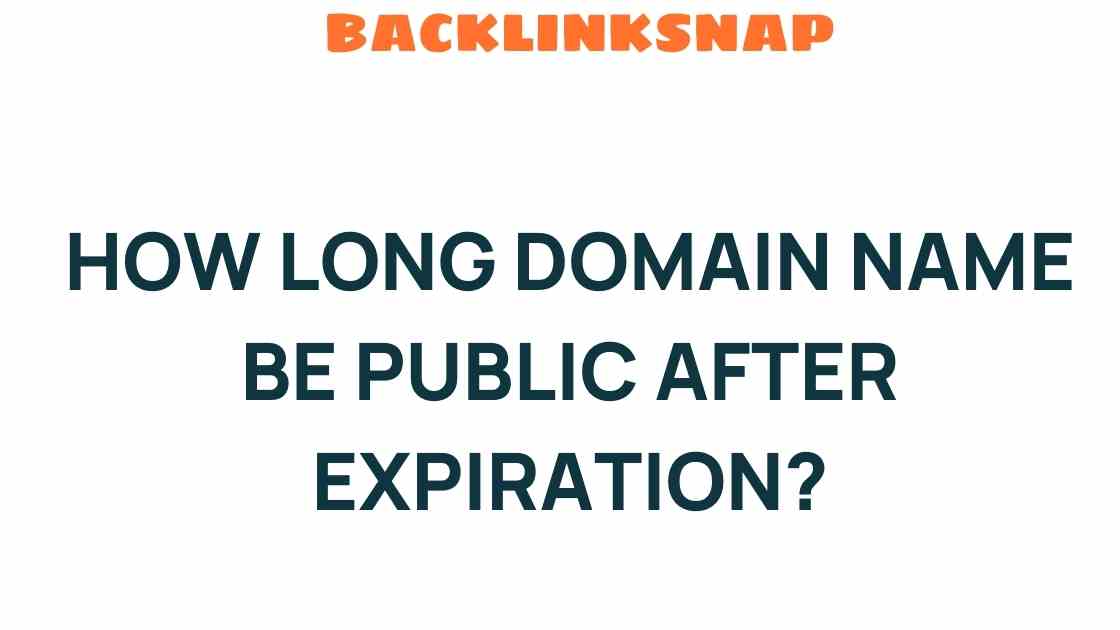How Long Does a Domain Name Remain Public After Expiration?
Understanding domain name expiration is crucial for anyone looking to maintain a strong online identity. When a domain name reaches its expiration date, what happens next can significantly impact your web presence. This article delves into the timeline and processes that follow domain expiration, exploring the implications for domain ownership, recovery options, and the potential for expired domains to be auctioned off.
What Happens When Your Domain Name Expires?
When you register a domain name, you typically do so for a period ranging from one year to several years. Upon reaching the end of this period, the domain enters a grace period. The sequence of events following expiration is critical to understanding how long a domain remains public:
- Expiration Date: This is the date when your registration officially ends.
- Grace Period: Most registrars offer a grace period of about 30 days. During this time, the domain is still technically yours, and you can renew it without incurring any additional fees.
- Redemption Period: If you fail to renew your domain during the grace period, it enters a redemption phase that lasts around 30 days. At this point, the domain is removed from your control, but you can still recover it, albeit at a higher cost.
- Pending Deletion: After the redemption period, the domain enters a pending deletion phase lasting around 5 days. Once this period elapses, the domain is released back into the pool of available domains.
This timeline can vary slightly between registrars, so it’s advisable to check the specific policies of your registrar. Understanding these phases is vital for anyone serious about maintaining their domain ownership.
Domain Recovery Options
If your domain has expired and you wish to recover it, you have options, though they come with varying costs and timelines:
- Renew During Grace Period: The easiest way to recover your domain is to renew it during the grace period. This is often done at the standard renewal rate.
- Redeeming After Expiration: If you miss the grace period, you can still redeem your domain. This usually involves a higher fee that can range from $50 to $300, depending on the registrar.
- Backorder Services: If the domain is highly desirable and you fear losing it, consider using a backorder service. This service will attempt to acquire the domain as soon as it becomes available again.
Acting quickly is essential, as the longer you wait, the more likely someone else will snatch up your domain as an expired domain.
The Fate of Expired Domains
Once a domain name enters the public domain after the pending deletion phase, it becomes available for anyone to register. This can lead to various outcomes:
- Domain Auctions: Some expired domains are auctioned off, particularly if they have high traffic or SEO value. Auctions can create a competitive environment, driving up the price.
- Domain Transfer: If you find an expired domain that fits your needs, you can register it immediately. This process is straightforward and similar to registering any new domain.
- Domain Flipping: Some entrepreneurs specialize in purchasing expired domains and reselling them at a profit. This can be a lucrative business for those who understand market trends and domain value.
Monitoring expired domains can be a savvy move for those looking to enhance their web presence and online strategy.
The Importance of Timely Renewal
Given the potential pitfalls of domain expiration, it’s essential to prioritize timely renewal. Here are some best practices:
- Set Reminders: Use calendar reminders to notify you 30 days before the expiration date.
- Enable Auto-Renewal: Many registrars offer an auto-renewal option. This can save you from the hassle of manually renewing your domain.
- Keep Payment Information Updated: Ensure your payment methods are current to avoid renewal failures.
By taking these proactive steps, you can safeguard your digital identity and mitigate the risks associated with domain name expiration.
FAQs About Domain Name Expiration
1. How long does a domain name remain public after expiration?
A domain name typically enters a grace period of about 30 days after expiration, followed by a redemption period of approximately 30 days before it goes to pending deletion for 5 days.
2. Can I recover my expired domain easily?
Yes, if you’re within the grace period, you can renew your domain at no extra cost. After that, recovery is possible but may incur additional fees.
3. What happens to my website if my domain expires?
Your website will become inaccessible once the domain expires, but it can be restored if you renew it during the grace period.
4. How can I find out when my domain expires?
You can check your domain’s expiration date through your registrar’s account dashboard or by using WHOIS lookup services.
5. Are expired domains valuable?
Yes, expired domains can be valuable, particularly if they have existing traffic, backlinks, or brand recognition, making them attractive for resale or use.
6. What should I do if I lose a domain I want?
You can try to recover it during the redemption period, or if it goes to auction, you can participate in the auction to try and win it back.
Conclusion
Understanding the intricacies of domain name expiration is vital for anyone invested in their online identity. By knowing the timeline and options available for recovering expired domains, you can maintain your web presence and avoid the pitfalls of losing your valuable domain. Proactive management, including timely renewal and monitoring of domain status, is key to safeguarding your digital assets. Remember, the internet is a competitive space, and every moment counts when it comes to your online identity and presence.
For more detailed information on domain management, feel free to explore further resources like ICANN and consider using domain registration services that can help you manage your domains effectively.
This article is in the category Digital Marketing and created by BacklinkSnap Team




